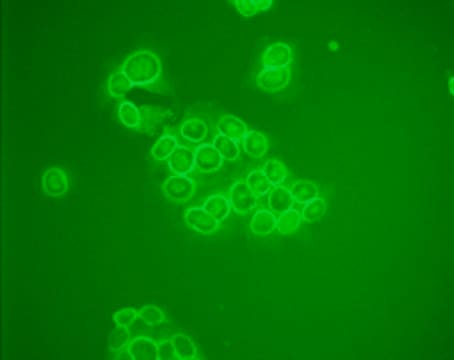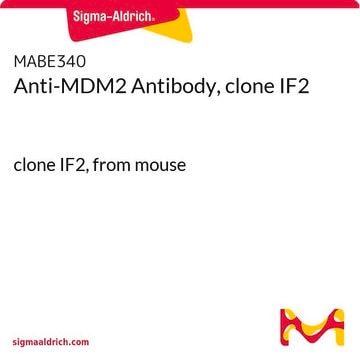M7815
Anti-MDM2 antibody ,Mouse monoclonal
clone HDM2-323, purified from hybridoma cell culture
Synonim(y):
Anti-ACTFS, Anti-HDMX, Anti-LSKB, Anti-hdm2
About This Item
Polecane produkty
pochodzenie biologiczne
mouse
białko sprzężone
unconjugated
forma przeciwciała
purified from hybridoma cell culture
rodzaj przeciwciała
primary antibodies
klon
HDM2-323, monoclonal
Postać
buffered aqueous solution
masa cząsteczkowa
antigen ~90 kDa
reaktywność gatunkowa
human, mouse
stężenie
~2 mg/mL
metody
indirect ELISA: suitable
microarray: suitable
western blot: 1-2 μg/mL (whole cell extract of 293T cells transfected with human MDM2)
izotyp
IgG2a
numer dostępu UniProt
Warunki transportu
dry ice
temp. przechowywania
−20°C
docelowa modyfikacja potranslacyjna
unmodified
informacje o genach
human ... MDM2(4193)
mouse ... Mdm2(17246)
Opis ogólny
Immunogen
Zastosowanie
Działania biochem./fizjol.
Postać fizyczna
Oświadczenie o zrzeczeniu się odpowiedzialności
Not finding the right product?
Try our Narzędzie selektora produktów.
polecane
Kod klasy składowania
10 - Combustible liquids
Klasa zagrożenia wodnego (WGK)
WGK 3
Temperatura zapłonu (°F)
Not applicable
Temperatura zapłonu (°C)
Not applicable
Certyfikaty analizy (CoA)
Poszukaj Certyfikaty analizy (CoA), wpisując numer partii/serii produktów. Numery serii i partii można znaleźć na etykiecie produktu po słowach „seria” lub „partia”.
Masz już ten produkt?
Dokumenty związane z niedawno zakupionymi produktami zostały zamieszczone w Bibliotece dokumentów.
Nasz zespół naukowców ma doświadczenie we wszystkich obszarach badań, w tym w naukach przyrodniczych, materiałoznawstwie, syntezie chemicznej, chromatografii, analityce i wielu innych dziedzinach.
Skontaktuj się z zespołem ds. pomocy technicznej







